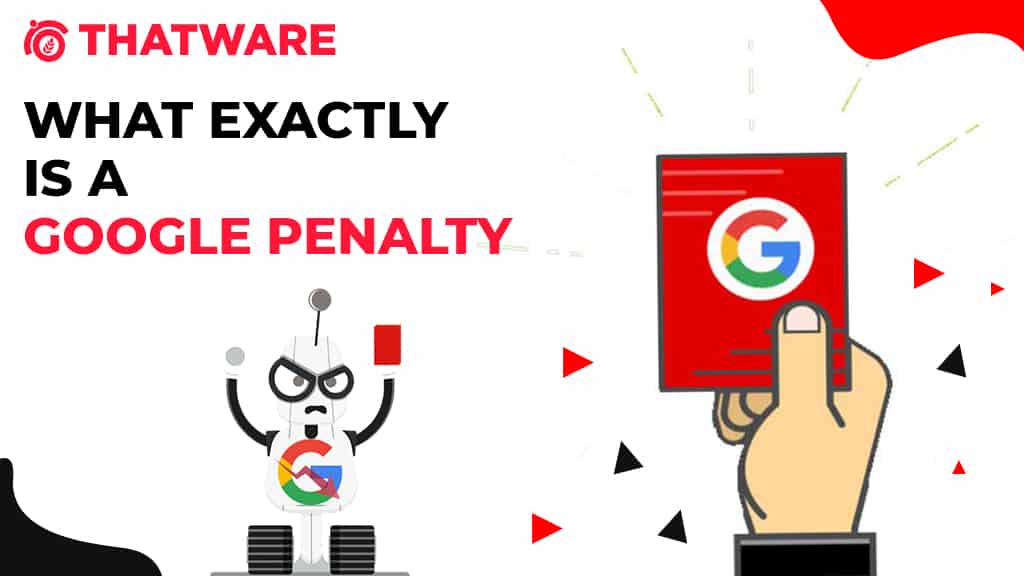Get a Customized Website SEO Audit and Online Marketing Strategy and Action
What Exactly Is A Google Penalty?
SEO’s word “penalty” refers to any negative impact on a website’s organic search rankings generated by an algorithm change or a human intervention.
Anything that directly contradicts Google’s Webmaster Guidelines may result in a penalty for your website. The two primary forms algorithm-based, automated, and manual, which is a deliberate punishment for “black hat” behaviors.
Although Google does not refer to these algorithmic hits as “penalties,” the ultimate consequence seems the same to a website owner. It’s as if someone raised a red flag against your website.

What Is The Purpose Of Google Penalizing Websites?
- Your Website Has Become Obsolete.
The design of a website has a significant impact on its site rating. The two most important design considerations are whether the site is mobile-friendly and new or up-to-date.
When creating your website design, don’t forget to include meta titles and meta descriptions. They assist Google in determining which keywords your website wants to rank for; without them, Google may fail to identify your site as relevant and punish you.
Awful Link Structure
What factors contribute to link structure? Let’s take a closer look:
- External links – These are hyperlinks that connect your material to other websites. You want to connect to other high-ranking websites for Google to correlate your material with other high-quality sources. Furthermore, these sites should be relevant. Linking to low-quality or unrelated content sites will put you on Google’s radar and cause your rating to decline.
- Internal links — they connect your website’s content to other pages. It offers Google a sense of how your website is laid out and what your site’s general content is like. It is critical to interlink to relevant resources. If you link to your expensive gift store from your blog article on saving money, for example, you may be penalized.
- Backlinks are links from other websites that point back to yours. Backlinks are used to obtain high-ranking websites to link back to you. This is high-level, but the concept is that you want to avoid false or illegitimate websites to keep your rating high.
Remember that quality is more important than the number when it comes to links.
Purchasing Links
Yes, some businesses continue to purchase links to their website to improve their rating.
Google perceives this as an attempt to cheat PageRank, which determines where your site should appear in search engine results based on what Google considers to be relevant and high-quality content.
When you try to influence Google, they may detect this — as well as the poor links you’ve been purchasing. Buying links can potentially knock you out of the rankings entirely.
- Your Content Is Of Little Worth.
This might range from a lack of material to shallow content that your visitors have previously discovered on several other sites or content attempting to rank for keywords. All of these are incorrect ways for your content to assist rank your website.
Readers should be able to find useful information on your website. Google looks at how visitors engage with your website. If visitors to your site depart promptly, Google will notice that users do not value your content and punish your site and its rating.
- Slower Rates
How irritated are you when a page takes 10 seconds to load? Do you close the window and move on?
Many individuals do, and Google is aware of it. To overcome this problem, ThatWare suggests utilizing a cache plugin or a CDN straight now.
If you’re not sure how quick your current site is, use Google’s PageSpeed to see if there’s anything you can do to enhance your desktop or mobile site load speed.
The Top 3 Tips For Avoiding Google Penalties
You can take action to reduce the issues that lead to SEO penalties. Here are the top three rules for avoiding a penalty:
- Do not purchase links. Links that convey SEO value to your site should appear natural. Avoid link schemes and ensure that sponsored links (such as adverts) have a “no-follow” tag.
- Avoid overusing buzzwords. Exact repeats of a key term in your text might harm your search engine rankings. Keywords are vital but use them judiciously and in a natural-sounding manner.
- Create unique, high-quality material. To rank, you must have unique, high-quality web pages.
Google Penalties Sorted by Name
Penalties range from a little, temporary ranking drop (a slap on the wrist) to removal from the search engine’s index.
Don’t be fooled by the charming black-and-white creatures. Search engine algorithms have teeth and may bite websites that break the rules.
- Google Panda Penalty
With the first of several rollouts, the Panda upgrade was released in February 2011. Panda has matured and become a component of Google’s core algorithm by early 2016.
The Google Panda algorithm is designed to keep low-quality information from rising to the top of search results.
If Panda believes your website has low-quality content, your web pages will struggle to rank. Examples of low-quality online content include “thin” pages with little or no additional value, product pages with manufacturer-supplied descriptions and no unique material, and extensive duplicate content.
To Avoid a Panda Penalty, follow these steps:
Provide creative material that will please searchers to keep Panda fed and satisfied.
With a Panda problem, you may earn your way back up the search results by fattening up (rewriting/improving) your thin material, removing duplicate pages (or banning them from search engines), and overall offering high-quality content for your site visitors.
Google Penguin Penalty
The Google Penguin algorithm detects link spam and thereby combats web spam.
When a site’s backlink profile (the whole list of connections originating from external sites) has an excessive number of unnatural-looking links, Google accuses that site of attempting to influence search rankings — and Penguin’s feathers are justifiably ruffled.
In April 2012, Google released the first Penguin update. After many excruciatingly delayed rollouts, Google released a final upgrade in September 2016. Penguin is now a real-time component of Google’s main ranking algorithm.
According to Google, the new Penguin algorithm no longer imposes fines. Rather than demoting a site with low-quality connections, Penguin now devalues faulty inbound links such that they do not affect the site’s results.
Your link profile, on the other hand, remains your responsibility. A high number of bad backlinks is a symptom of low trust. Many sites that were penalized by Penguin must still take efforts to recover.
Avoiding a Penguin or Link-Related Penalty:
If Google discovers a site buying or selling links, negotiating link swaps, participating in link farms, or engaging in any artificial linking, the site should be prepared to be punished.
In addition, if your organic search traffic suddenly reduces, it might be due to a link-related penalty.
Monitor and clean up your backlinks regularly to avoid Penguin troubles.
Interstitial Invasion Penalty
The Intrusive Interstitial Penalty, implemented in January 2017, solely impacts mobile search results.
Google penalizes websites that provide an intrusive ad, popup, or standalone interstitial to a mobile user right after clicking a mobile search result.
In general, Google degrades websites that make it difficult for searchers to read the information. Certain interstitials, such as login forms and legally required gates, are not punished (for age verification or other).
How to Avoid an Interstitial Penalty:
Provide an excellent user experience to mobile searchers. Avoid advertising and popups that take up too much space on the screen immediately after a searcher enters.
- Payday Loans Penalty
In June 2013, Google modified its algorithm to improve results for regularly spammed searches such as “payday loans,” “viagra,” and pornography-related keywords.
Avoiding a Payday Loan Penalty: Sites that the Payday Loan update has punished are typically significantly involved in link schemes, online spam, and, in some cases, criminal activity. Avoid them if you don’t want to lose your organic search engine rankings.
Manual Procedures
Aside from all algorithmic penalties, a search engine employee might personally force your website to go up or down in the ranks. Google’s webspam staff can manually examine websites, issue fines, and even remove a site from the index.
What is the reason for a manual review? Because of possible foul play, the search engine may be looking into it more closely. (Did you know that rivals report the majority of spam?) Alternatively, Google’s team may be re-evaluating a website that has sought “reconsideration” after resolving its penalty concerns.
How to Look for Manual Actions:
If your site receives a manual action notice, Google will notify you politely. In fact, in 2016, Google sent over 9 million webspam notices to webmasters.
Here’s how to check to see whether your site has any messages (positive or bad):
- Sign in to your Google Search Console account.
- View the Manual Actions report.
- Read any notifications to learn the exact reasons for the manual action and where portions of your site are affected by the penalty.
Avoiding a Manual Action Penalty:
Anything that explicitly violates Google’s Webmaster Guidelines might result in manual actions. They frequently refer to insufficient content, unnatural links, pure web spam, or other noncompliance concerns.
If your site receives a manual penalty, correct the issue(s) that caused the manual action as quickly as possible.
Submit a reconsideration request after you’ve cleaned up your site. Google will re-examine your site and will remove the penalty if it appears to be in excellent working order.
How To Avoid Being Penalized By Google Don’t Purchase Links
Avoid those commercials that appear on your phone, no matter how appealing the offer may appear. They’re never original when they say ‘get original links for $99’. If you purchase them, your website may end up costing more than USD 99. Google has no sympathy for websites that purchase links; they will find out and penalize you.
Inadequate and Negative Content
Google has upgraded BERT (Bidirectional Encoder Representations from Transformers), which can understand webpages with comparable content better than humans. As the Google BERT is implemented, more and more pages are impacted. This means that having more shallow and duplicate material will result in a penalty. Always publish well-researched, in-depth material for your website.
Don’t Hide Your Content
Google dislikes the concept of ‘tricking’ its way to a high position. Google prioritizes transparency and uniqueness. To hide content, some webmasters may match the text to the page’s background colour. While they may believe they would rank better, they are instead putting themselves in Google’s bad graces.
Stay away from keyword stuffing.
Only high-quality material with appropriate keyword density is desired. Due to current enhancements in robots and algorithms that have proved to read material better than humans, keyword stuffing may be the largest blunder a webmaster can commit.
Create User-Friendly URLs
To avoid penalties on particular pages, create URLs that are well-written and easy to understand for the user. Yes, it’s usual to include certain keywords, but make sure they complement the content. You want to make a user-friendly and crawlable URL.
Follow Google Webmaster Guidelines
Whatever you do, keep in mind that you have regulations to observe. Create material in the manner desired by Google, obtain original links, avoid keyword stuffing, and make your website user-friendly, to name a few. You can read the entire thing here.
Avoid Over-Optimization of Anchor Text
Be cautious when utilizing anchor text, as it is one of the most common things Google penalizes. If you use it too much or too little, it might harm your rankings. The text you may click to be directed to another website or page is anchor text.
Demonstrate Your Credibility
When writing outstanding content, keep in mind that putting all of your company’s information out there will boost your chances of being spotted.
Google wants to give its consumers a high-quality experience, and it will want to supply them with excellent and genuine companies that they can rely on if they require your services. If you own a business, make sure your customers have a positive experience and that your website is simple to use.
Most companies rely on organic traffic to develop and cannot afford any penalty on their website. The majority of them use SEO specialists to assist them in doing checks and taking preventative steps as needed.
Google Penalty Analysis and Recovery: Your Path to SEO Success with ThatWare
In the ever-changing world of SEO, a Google penalty can have a devastating impact on your website’s ranking and online visibility. Whether it’s a manual penalty issued by Google’s webspam team or an algorithmic penalty resulting from updates like Penguin, Panda, or Core, the consequences can be long-lasting and challenging to recover from. However, with the right strategy and expertise, recovery is possible. That’s where ThatWare comes in, providing expert Google penalty analysis and recovery services to help your site bounce back stronger than ever.
What is a Google Penalty?
A Google penalty is a punishment imposed by Google when your website violates its Webmaster Guidelines. These penalties are Google’s way of ensuring that websites providing poor user experience, using manipulative tactics, or violating its rules do not rank higher in search results.
Penalties can be either manual or algorithmic:
- Manual Penalties: These are imposed by Google’s team of webspam experts when they detect unnatural or manipulative practices on a website. You will typically be notified of a manual penalty through Google Search Console, which will show a message outlining the violation.
- Algorithmic Penalties: These are automatic penalties triggered by Google’s algorithms during updates. They usually involve a ranking drop or removal from the index and can be harder to identify without an in-depth analysis of site performance before and after an algorithm update.
Causes of Google Penalties
Many factors could lead to a Google penalty. Here are some of the most common reasons:
- Low-Quality Content: Content that provides little to no value to users, such as thin content, keyword stuffing, or duplicate content, is a major red flag for Google.
- Backlink Issues: Google looks at the quality and quantity of backlinks to determine a site’s authority. Manipulative link-building practices, such as buying backlinks, using link farms, or participating in link schemes, can result in penalties.
- Hidden Text or Links: Trying to trick Google by hiding text or links (e.g., using white text on a white background or having links in non-visible parts of a page) is against Google’s guidelines.
- Cloaking: This occurs when a website shows different content to users than to Googlebot. If Google detects this, it will impose a penalty.
- Slow Site Speed: A slow website can be a signal of poor user experience, and Google’s algorithms favor fast, mobile-friendly websites.
- Poor Mobile Experience: With mobile-first indexing, having a non-responsive or poorly optimized mobile site could be a major reason for penalization.
Identifying a Google Penalty
To determine whether your site has been penalized, you must first monitor your traffic and rankings. Significant drops in search engine visibility often indicate that something is wrong. Here are some steps to identify a penalty:
- Traffic Drop: Use Google Analytics to look for a sharp decline in traffic. If this happens after a Google algorithm update (which you can track using SEO tools), it’s a strong indicator that your site might have been penalized.
- Google Search Console: If you’ve received a manual penalty, you will be notified through Google Search Console. Check for messages under the “Manual Actions” section.
- Ranking Drops: Monitor keyword rankings before and after major Google algorithm updates. A drop in rankings that correlates with an update could mean your site has been affected by an algorithm penalty.
- Backlink Profile: Tools like Ahrefs, SEMrush, and Moz can be used to check your backlink profile. If you notice unnatural or low-quality backlinks, these could be the reason for your penalty.
How ThatWare Can Help You Recover from Google Penalties?
If your site has been hit by a Google penalty, ThatWare is here to guide you through the recovery process with expert Google penalty analysis and targeted strategies to help restore your rankings. Here’s how we can help:
1. Comprehensive Google Penalty Audit
The first step in penalty recovery is a thorough audit of your website to identify the underlying issues. Our team of SEO experts will conduct a comprehensive Google penalty audit, examining your website for signs of manual penalties, algorithmic penalties, and other SEO issues.
We’ll look at your content, backlinks, technical SEO factors, and user experience to pinpoint the exact cause of the penalty. Using advanced SEO tools and our years of expertise, we can quickly identify any violations that need to be addressed.
2. Disavowing Bad Backlinks
If your penalty is related to backlinks, the next step is to clean up your backlink profile. This includes identifying harmful or low-quality backlinks and disavowing them through Google’s Disavow Tool. We will also reach out to webmasters to remove any toxic links that might be dragging your site down.
3. Content Optimization and Quality Assurance
If your content quality is a concern, we will help you improve it. Whether it’s rewriting thin or duplicate content, enhancing user experience, or adding more valuable information, we’ll ensure that your website provides the high-quality content that Google demands.
4. Fixing Technical SEO Issues
Google penalizes sites that have poor technical SEO. Slow page load times, broken links, mobile usability issues, and poor site architecture can all contribute to a penalty. Our technical SEO experts will address these issues to ensure your website complies with Google’s technical requirements.
5. Recovery Strategy for Algorithmic Penalties
For algorithmic penalties, recovery is more challenging, as there is no direct notification from Google. We will carefully analyze your site’s performance during past algorithm updates and make the necessary adjustments. Whether it’s improving your content, cleaning up your backlinks, or enhancing your site’s mobile performance, we have a proven recovery process.
6. Requesting Reconsideration for Manual Penalties
Once we’ve addressed the issues that led to the manual penalty, we’ll help you craft a reconsideration request to Google. This request explains the steps we’ve taken to correct the violations and assures Google that the website is now compliant with their guidelines. Google will review the request and, if they’re satisfied, they will lift the penalty.
7. Ongoing Monitoring and Reporting
After penalty recovery, ongoing monitoring is crucial to ensure that your site remains compliant with Google’s guidelines. We provide regular reporting and updates, tracking your site’s rankings, traffic, and overall SEO performance. With continuous optimization, we’ll help your site maintain long-term success.
Why Choose ThatWare for Google Penalty Recovery?
- Proven Track Record: With years of experience in SEO and penalty recovery, we have successfully helped businesses recover from all types of Google penalties.
- Comprehensive Approach: Our team takes a holistic approach to penalty recovery, addressing all factors affecting your site’s SEO performance, from content quality to backlink health and technical SEO.
- Customized Solutions: Every website is unique, and so are the challenges it faces. We create tailored strategies for each client to ensure the best chance of recovery.
- Expert SEO Team: Our experts stay up-to-date with the latest Google algorithm updates and best practices to deliver the most effective solutions for your website.
Conclusion
Recovering from a Google penalty can be a complex and time-consuming process, but with ThatWare’s expert Google penalty analysis and recovery services, you don’t have to go through it alone. Our team is dedicated to helping you identify the issues that caused the penalty, fix them, and put your site back on the path to SEO success. If you’ve been affected by a Google penalty, contact ThatWare today to begin the recovery process. Let us help you get back to ranking and driving traffic!

Thatware | Founder & CEO
Tuhin is recognized across the globe for his vision to revolutionize digital transformation industry with the help of cutting-edge technology. He won bronze for India at the Stevie Awards USA as well as winning the India Business Awards, India Technology Award, Top 100 influential tech leaders from Analytics Insights, Clutch Global Front runner in digital marketing, founder of the fastest growing company in Asia by The CEO Magazine and is a TEDx speaker and BrightonSEO speaker.


